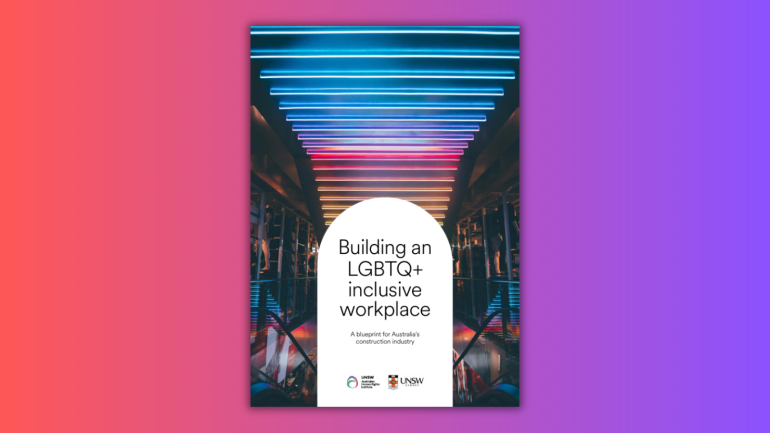While workplace attitudes in Australia appear to be improving for LGBTQ+ employees, new research from the Australian Human Rights Institute has found homophobia, bullying and harassment continues in the construction industry, often in full view of fellow workers and leaders.
The experiences of LGBTQ+ people in Australia’s most male-dominated industry and third largest national employer form part of a report released today titled, Building an LGBTQ+ inclusive workplace: A blueprint for Australia’s construction industry. Participants in the study ranged from tradespeople to senior executives of multinational companies, and gave detailed accounts about coming out at work, the experience of transitioning gender in the workplace, and the effectiveness of existing diversity and inclusion strategies.
Lead author of the report Dr Natalie Galea said that while most participants felt there was a positive trajectory in workplace attitudes towards LGBTQ+ people, many noted the sector was coming off a very low base and that it would be a long time before it caught up to other industries.
“The research found it was particularly challenging for those in junior positions, apprentices and FIFO workers to navigate the construction sector as an LGBTQ+ worker due to a lack of power and a desire to ‘fit in’ to avoid anticipated negative responses,” Dr Galea said.
“Determining whether it was safe to come out during workplace encounters could be a constant source of anxiety, adding to the stress of those working in already dangerous environments.”
Co-author Dr Melissa Jardine said the research found that industry leaders often lacked awareness of inclusive LGBT+ practices and in some cases failed to act on homophobic or discriminatory behaviours.
“Despite many examples of good leadership, participants expressed frustration that some leaders turned a blind eye and failed to act or challenge homophobic behaviour and attitudes, especially from ‘old school’ men,” Dr Jardine said.
“There was a perception that instead of intervening, leaders were hoping that generational change would resolve these issues.
“Participants also acknowledged the importance of larger businesses' influence on smaller businesses in relation to LGBTQ+ inclusion.”
Lendlease Building CEO Dale Connor acknowledged the need for employers, employees and subcontractors across the industry to play their part in creating safe and fully inclusive workplaces.
“Lendlease is committed to partnering with others in our sector to accelerate the pace of LGBTQ+ inclusion – but given the subcontract nature of our industry we can only create inclusive workplaces if we’re all fully on board and playing our part,” Mr Connor said.
“We hope our support of this ground-breaking research will ultimately help the industry to create truly inclusive workplaces that deliver better performance, foster innovation and make space for all.”
The report includes recommendations for government and businesses engaged in the construction sector to recalibrate industry behaviours and value the engagement of all workers, including:
- A helpline and mental health service for LGBTQ+ tradies should be established, with qualified counsellors who understand the construction sector
- Government and construction company procurement processes should require contracting companies to demonstrate substantive action towards the inclusion and safety of LGBTQ+ workers
- Government clients and construction companies with existing LGBTQ+ policies should share these policies with their supply chain and build inclusion capability
- Collaboration between industry and universities on LGBTQ+ inclusion to build a pipeline of talent
- LGBTQ+ inclusion policies should be made publicly available to attract the best talent during job searches
- Sexism, homophobia and transphobia education should be added to leadership training and training kits, and shared with broader supply chains
- Company and site safety inductions should recognise the diversity of workers, identify that a business/construction site is LGBTQ+ friendly and that homophobic and discriminatory language will not be tolerated.
The report also calls for more research in this area, including an evaluation of the effectiveness of policy interventions by business and government to support the inclusion of LGBTQ+ people, and studies to quantify the number of LGBTQ+ people working in the Australian construction sector, specifically mapping where they work and their professions.
Building an LGBTQ+ inclusive workplace: A blueprint for Australia’s construction industry was sponsored by the Lendlease Foundation.
Read the full report here.
